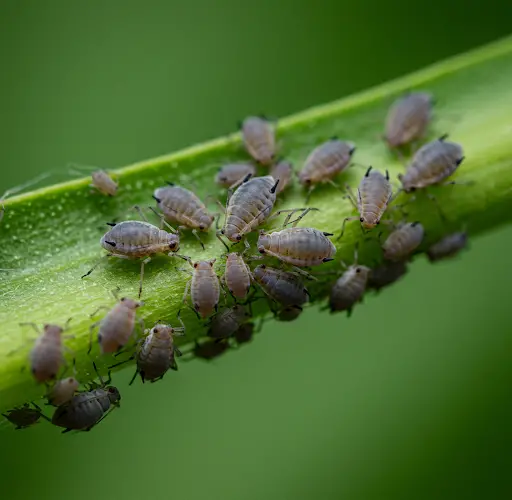Aphids are one of the most common and persistent pests that affect flowers, vegetables, and fruit-bearing plants. These small, winged insects are highly reproductive and can cause significant damage to plants by feeding on their juices. They tend to cluster on leaves, flowers, and stems, weakening plants and potentially leading to their destruction if left unchecked.
From spring to autumn, aphid infestations become a major concern for gardeners. If not addressed promptly, these plant lice can cause leaves to curl, flowers to wither, and entire plants to dry out. To protect plants from these pests, many people seek natural solutions that are both effective and safe for the environment. In this article, we will share a highly effective natural remedy for aphid control using hot pepper. This solution is easy to prepare at home, does not require synthetic pesticides, and can be used for both outdoor and indoor plants.
Natural Aphid Control Methods
Many gardeners prefer to use natural methods for pest control, as chemical pesticides can be harmful to the environment, beneficial insects, and even human health. Among the various organic remedies available, wood ash has been found to be an effective deterrent against aphids. However, not everyone has access to wood ash, which is why we recommend an alternative solution using hot pepper.
The Power of Hot Pepper
Hot pepper is widely available and contains a potent natural compound called capsaicin. This active ingredient is responsible for the pepper’s spicy heat and has been shown to be highly effective in repelling pests. Capsaicin affects insects’ nervous systems, making hot pepper an excellent natural pesticide against aphids, mites, stink bugs, caterpillars, and other garden pests.
How to Prepare a Hot Pepper Solution for Aphid Control
This homemade remedy is simple to make and requires only a few ingredients. Follow the step-by-step guide below to prepare and use the solution effectively:
Ingredients:
- 1 teaspoon (small spoonful) of hot pepper powder
- 500 ml (approximately 2 cups) of water
- 1 liter of additional water for dilution
- A small amount of ecological dish soap (optional but recommended)
Instructions:
- Add one small teaspoon of hot pepper powder to 500 ml of water.
- Mix the solution thoroughly and let it sit for about 36 hours. This allows the capsaicin to infuse into the water.
- After 36 hours, strain the liquid through a cloth or fine sieve to remove any solid particles. This prevents clogging when using a spray bottle.
- Dilute the concentrated mixture by adding 1 liter of additional water. This ensures that the solution is not too strong, as high concentrations can harm plants.
- Add a few drops of ecological dish soap to the mixture. This helps the solution adhere to the leaves and stems of plants, increasing its effectiveness against aphids.
Application Guidelines
To achieve the best results, follow these application guidelines:
- Apply in the evening: Spraying plants in the late afternoon or evening helps prevent sunburn and reduces evaporation, allowing the solution to remain on the plant longer.
- Avoid windy conditions: Spraying on a calm day prevents the solution from being blown away before it can take effect.
- Spray directly onto affected areas: Focus on leaves, stems, and flowers where aphids are present.
- Repeat the treatment every 7 days: This ensures that newly hatched aphids are also eliminated.
- Be cautious with young and sensitive plants: Test a small portion of the plant first to ensure it does not react negatively.
Additional Pest Control Benefits
Aside from being an effective aphid repellent, hot pepper solution also works against other garden pests. It has been found to deter:
- Stink bugs: These insects cause significant damage to vegetables and fruits.
- Potato beetles: Known for destroying potato crops, they are highly sensitive to capsaicin.
- Caterpillars and slugs: The spicy nature of the solution discourages them from feeding on plants.
- Mites and other small pests: Capsaicin disrupts their ability to feed and reproduce.
Precautions When Using Hot Pepper Solution
While this solution is natural, it is still powerful and should be used with care:
- Avoid spraying during flowering and fruit formation: Excessive use during these stages may stress the plant and impact fruit production.
- Wear gloves and avoid contact with eyes: Capsaicin can cause irritation, so handle with caution.
- Test on a small area before widespread use: Some delicate plants may be more sensitive to the solution.
Conclusion
Controlling aphids and other pests in the garden does not require harmful chemicals. By using a simple homemade hot pepper solution, gardeners can effectively protect their plants in an eco-friendly manner. This method is safe for use in organic gardening, easy to prepare, and can be an excellent alternative to synthetic pesticides. With consistent application and proper precautions, your plants can remain healthy and pest-free throughout the growing season.
If you have experience with natural pest control methods, feel free to share your insights in the comments. Have you tried using hot pepper or other organic solutions? Let us know how they worked for you!



